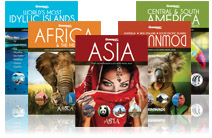Malawi History
Archaeological excavations from around Malawi suggest that people have inhabited the area from as far back as the late Stone Age and Iron Age. Between 1200-1500 AD, the Bantu people began arriving in Malawi from Central Africa. By 1480, the Maravi Empire had been established, and it is believed that the word Malawi comes from this empire. Some suggest that Maravi means “flames”, which would be appropriate as the people of the Maravi Empire were ironworkers.
The 19th century in Malawi witnessed migration in the north and the south as the Yao people invaded from western Mozambique and groups of Zulu came to settle in the north. Trade was also prevalent in Malawi during the 19th century when Portuguese and Arab traders came to trade in iron, ivory and slaves. Lakeside towns like Nkhotakota and Salima became trade centres for slaves.
David Livingstone, a famous Scottish explorer, came to Malawi in September 1859. He became an important crusader against slavery after witnessing the horrors firsthand. He was responsible for publishing about such horrors back home in Britain. Following Dr. Livingstone’s death in 1873, missionaries were inspired to come to Malawi, bringing with them religion and business customs.
In 1889, Cecil Rhodes’ British South Africa Company entered Malawi. Two years later, the British Central Africa Protectorate was expanded to include Malawi and Southern and Northern Rhodesia (now Zambia and Zimbabwe). As a result of conflicting demands between the areas, Malawi was made into a separate colony. Colonial rule greatly affected Malawi. Although it brought an end to slave-traders, it brought more Europeans who took land and control from local populations.
There was a great deal of opposition to colonial rule that continued for decades. During the 1950s, the Nyasaland African Congress party (NAC), led by Dr. Hastings Kamuzu Banda, started a genuine campaign for independence. By 1964, the colony known as Nyasaland became the independent country of Malawi. In 1966, the country became a republic with Banda as its president.
In 1971, Banda declared himself “President for Life”, and in doing so, maintained a firm rule over the country. His opponents were either jailed or exiled, and his rule was heavily criticized. The 1990s saw a sick Banda relinquish some control. As a result, a new constitution was put in place and parliamentary and presidential elections were held in 1994. Bakili Muluzi and the United Democratic Front (UDF) were the ultimate victors. Under this new political system, political prisons were closed and there were important economic reforms.
In 2004, Bingu wa Mutharika became president and began a period of reform. He wanted to eliminate corruption, become more aggressive in the fight against AIDS/HIV, and wanted to attract foreign investment. Eight years later, Malawi elected Joyce Banda, the country’s first female president.
It is unfortunate that Malawi is often seen to pale in comparison to its neighbours because it offers a great deal to those who visit. The country is home to many successful conservation efforts and wildlife reintroduction programs, and as such, it has become an excellent destination for safaris. It also offers incredible scenery, nature, friendly people and a peaceful atmosphere.
Get a Trip Quote Order a Brochure

















